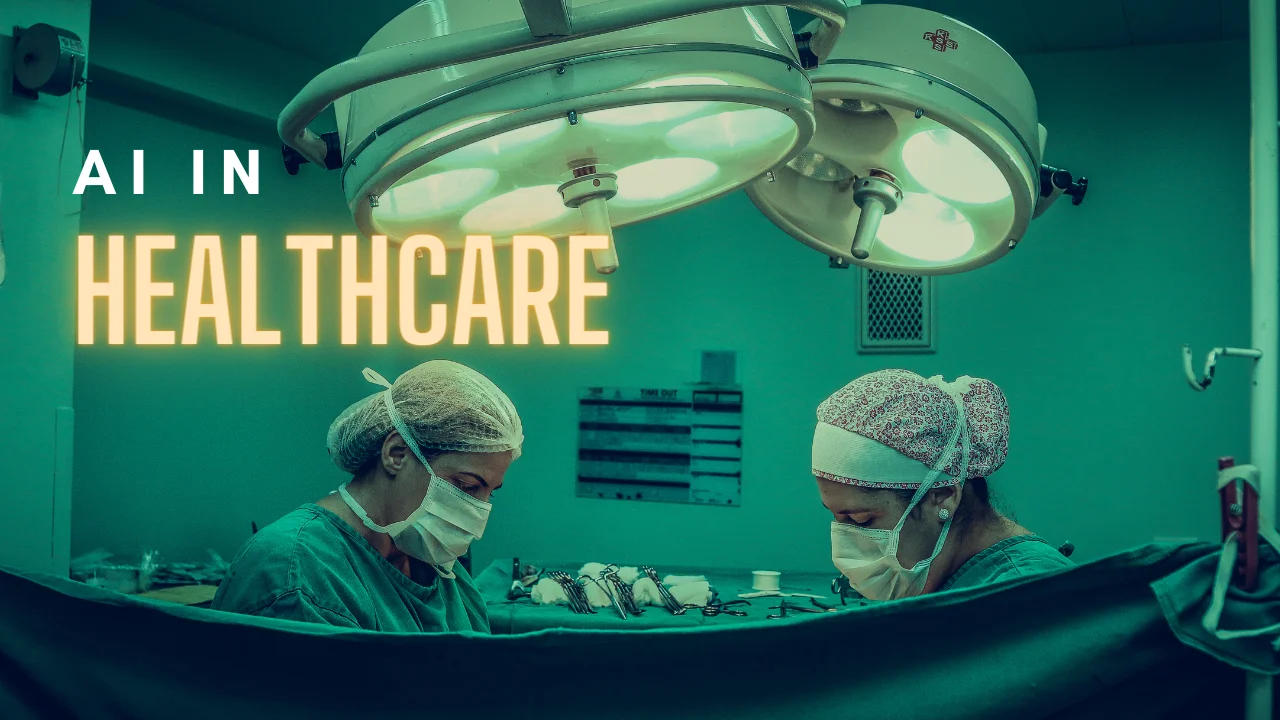Healing with Algorithms: AI in Healthcare
 Ilma Last Updated: September 28, 2023
8 min read
Ilma Last Updated: September 28, 2023
8 min read 
Advancing Medicine: Role of AI in Healthcare
A significant change in the medical field has been caused by the incorporation of AI in healthcare. Let us explore its applications and prospective effects to understand the various facets of AI in healthcare.
Increasing Patient Engagement with Virtual Health Assistants
AI-driven virtual assistants for health are revolutionising interaction and patient involvement in healthcare. They assist in various ways, which include reminding patients to take their prescribed medications and attend their subsequent visits. These knowledgeable virtual nurses and chatbots can respond to medicine inquiries and help patients manage their chronic diseases. They excel in encouraging treatment compliance and patient satisfaction.
The Precision of Medicine with Improved Diagnostics.
Medical imaging and diagnostics represent one of the most potential fields of AI in healthcare. The ability of AI-powered algorithms to analyse images from medical devices like X-rays and MRIs has been astounding. Early identification and individualised treatment strategies are becoming more available, improving patient results and the standard healthcare system.
Quickening the Process of Drug Creation and Discovery
AI speeds up drug discovery by analysing large molecular databases and predicting possible interactions. This is another fabulous role of AI in healthcare. Artificial intelligence shortens drug development schedules and related expenses by quickly discovering potential drug candidates and forecasting their safety and effectiveness.
Analytics for Prediction and Preventive Healthcare
The ability of AI to analyse data is essential for healthcare. AI can spot trends and danger signs linked to different diseases by examining enormous amounts of patient information, such as medical records and genetic details. The chance of illness onset and advancement can be decreased using this data to conduct focused preventive care initiatives like lifestyle modifications.
Simplifying Administrative Work in Healthcare
Health record transcription and details extraction using natural language processing techniques can ease administrative strain and speed up data access. Automation of administrative duties has proven valuable. AI-driven automation also optimised resource distribution, scheduling appointments, and lowering operating expenses.
Precision in Robot-Assisted Surgeries
Surgeons may perform complex surgeries with increased precision and efficiency by merging robotic technology with AI. This reduces the possibility of mistakes made by humans. These minimal invasion surgeries frequently lead to less scarring and quicker recoveries, which is advantageous for healthcare systems and patients.
Artificial Intelligence in Healthcare: Implementation Challenges
Data Security and Privacy
To protect patient data, artificial intelligence in healthcare must be used with strict security measures. As AI systems gather enormous volumes of information on a person's health, it is crucial to protect data privacy and security to avoid potential abuse.
Patient security and precision
When incorporating AI into healthcare, patient safety is a primary priority. To find patterns in medical data, comprehend the complex connections between diagnoses and therapies, and make exact suggestions that are catered to each patient individually, AI systems must be carefully trained.
Training Medical Data Algorithms
A big difficulty is figuring out how to teach AI computers to understand complicated medical data. These algorithms must become adept at navigating the subtleties of medical data, reliably identifying trends, and reaching defensible conclusions.
Adaptation to Current IT Systems
It's a difficult undertaking to integrate AI seamlessly into current healthcare IT systems. To make sure that AI complements and improves operational efficiency, it is necessary to have a thorough awareness of the present technological landscape.
Acceptance and Confidence of Doctors
For AI adoption to be effective, gaining the confidence and support of healthcare professionals is essential. AI systems must conform to the most recent, evidence-based medical research, and physicians must have faith that they offer trustworthy guidance. To build trust, AI decision-making processes must be transparent.
The Observance of Federal Regulations
The use of AI in healthcare must adhere to federal standards; this is a non-negotiable requirement. It is crucial to make sure that AI systems are used morally and without endangering patient safety. Strict compliance guarantees patient rights and the moral use of AI.
Healthcare Startups Embracing AI: A Strategic Transition
While some healthcare firms already use AI, others are carefully researching how to incorporate it into their workflows. The latter group includes Sesame Care, which demonstrates a convincing shift towards AI usage in the healthcare industry. Through a cash-pay single-visit model or membership subscription, Sesame Care acts as a bridge to link users with healthcare providers.
AI's revolutionary impact on provider productivity
According to Sesame Care, AI will eventually play a significant role in raising provider productivity. The startup specifically intends to use AI for note-taking and other duties that help healthcare providers be more efficient. Healthcare workers will be able to concentrate more on patient care thanks to this change, which should reduce administrative duties.
Patient Empowerment through AI-Enhanced Services
Beyond increasing physician productivity, Sesame Care intends to use AI to directly help patients. The patient experience will undergo a radical change thanks to AI, especially in the areas of search and question initiation. Sesame Care wants to improve the entire healthcare experience by using AI to better understand the requirements and preferences of patients.
The Natural Evolution of AI in Healthcare
The unquestionable shift in the healthcare industry towards AI-driven solutions is exemplified by Sesame Care's intentional effort towards integrating AI. This shift affects all organisations, not just those with an initial AI foundation, but also those open to innovation and adaptation. Proactively adopting AI can have considerable advantages for both patients and employers.
Enhancing Transparency and Accessibility for Lower-Cost Services
The main objective of Sesame Care is to simplify the complex healthcare system. The firm hopes to offer services that are not only economical but also transparent in terms of cost by utilising AI. By empowering both patients and healthcare professionals, this strategy increases the capacity of the healthcare system as a whole.
Finally, the strategic use of AI at Sesame Care is a shining illustration of the ongoing revolution of the healthcare industry. They hope to usher in a new era of accessible and transparent healthcare services, ultimately benefiting all system stakeholders, by utilising AI for provider productivity and patient involvement.
Conclusion
In summary, the introduction of artificial intelligence into healthcare heralds a significant advancement in the field known as "Healing with Algorithms." AI has quickly emerged as a disruptive force that has the power to completely alter many parts of healthcare, promising better patient outcomes, fewer mistakes, and greater effectiveness.
The influence of AI in healthcare is significant, ranging from virtual health assistants that include patients and improve treatment compliance to AI-driven diagnostics that enable early disease identification and individualised treatment programmes. Additionally, AI speeds up the development of new drugs, helps with predictive analytics for preventive care, simplifies office work, and improves surgical precision when using robots, all while upholding strict data security and privacy standards.
The need for strong data security, accurate AI algorithm training, seamless integration with current IT systems, and gaining the trust of healthcare professionals through open decision-making processes and adherence to federal regulations are some implementation challenges that call for careful consideration.
All parties involved in the healthcare ecosystem will ultimately profit from the natural progression of AI, which offers increased openness, accessibility, and more affordable services.
It is obvious that the potential for affordable, effective, and patient-centric healthcare services is within reach, offering a brighter and healthier future for everybody as we observe the continuous revolution in healthcare driven by AI.
Frequently Asked Questions
-
How can AI help in medical diagnosis?
- AI analyses medical data, including patient records, to assist in the timely identification and precise diagnosis of different illnesses.
-
Does robotic surgery employ AI?
- Yes, AI is used in surgical robots to improve surgery accuracy and effectiveness.
-
Can AI spot irregularities in medical imaging?
- To help physicians in diagnosis, AI algorithms may recognise anomalies and potential problems in medical imaging, including MRIs and X-rays.
-
Can AI forecast patient outcomes?
- Yes, AI may use patient data to forecast outcomes such as treatment responses and aid healthcare professionals in making wise decisions.
-
What are the obstacles to the use of AI in healthcare?
- Legal compliance, moral dilemmas, and data quality are a few difficulties.





